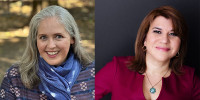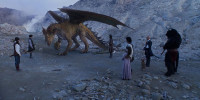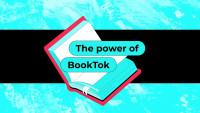
How to Make a Living as a Writer
thewalrus.ca – Tuesday May 20, 2025

Horse stories in the morning, erotica in the afternoon
When people ask what I do for a living, I’m faced with two choices: either I can lie or I can bore them with the truth, which is too complicated to explain succinctly. While those around me have normal, definable jobs—accountant, journalist, engineer—my work requires headings and subheadings to get it across properly: a map of overlapping gigs and contracts.
“What do you do?” It’s a simple question that often gets asked on first dates. No matter how much I pare down my reply, it’s always long winded.
“Well, I’m a freelancer,” I start, “so I have a million little jobs . . .”
The first of my million little jobs is what I call “Horse News.” It works like this: every weekday, I wake up at 6 a.m. and make my way to my desk, stumbling and still half asleep. I flick on an old lamp and wince as my eyes adjust to the light. I turn on my computer and use a piece of software that shows me all of the American horse racing–related news from the past twenty-four hours. It pulls up radio clips, Fox News segments, and articles from publications called BloodHorse or Daily Racing Form—anything that could be relevant to my interests.
I sift through countless story summaries, many of which sound fake. Army Wife defeats Crazy Beautiful Woman in race! Another doping scandal emerges in Northern California! A disgraced-but-very-good trainer is no longer banned from the track! A famous YouTuber has invested millions into a betting app! I compile the important stuff into a newsletter: stories about track renovations, big events, the series of horse laws that were passed, then repealed, then approved again in 2023.

What Happens When a Journalist and a Psychotherapist Write a Mystery Together?
crimereads.com – Thursday May 15, 2025

Kate Hilton, a practicing psychotherapist, and Elizabeth Renzetti, a career journalist, are the authors of the Quill & Packet mystery series. The first book, Bury the Lead, became a bestseller in Canada when it was published in early 2024. On May 1, Widows and Orphans continues the adventures of Cat Conway, a journalist for a cottage-country newspaper, as she investigates the murder of a wellness influencer and dodges attacks by misinformation-sowing locals.
On the eve of publication, the authors sat down for a conversation about their writing collaboration.
KH: It’s so great to be at a point where we’re launching the second book in the Quill & Packet series and writing the third one! It still feels kind of surreal to me.
ER: Especially as the world catches up to our fiction. In an earlier century we might have been burned as witches, because the mystery in Widows and Orphans is so timely: We’ve got the wellness industry, anti-vaccine protests, and a disinformation dumpster fire. As a journalist I’m used to being treated like a witch, though.
KH: I know what you mean. There’s some of that in the therapy room, too. One thing I love about this book is how we’ve captured some of the malign effects of living in an era of massive stress and uncertainty. People want to feel better; they want more control over their lives and more answers. It makes them vulnerable to bad actors selling snake oil – whether that’s in the form of products or “information”.

Do we really need more male novelists?
theguardian.com – Sunday May 4, 2025

There may not be obvious successors to the likes of Martin Amis and Salman Rushdie among today’s hotshot young writers. But is a new publisher dedicated to ‘overlooked’ male voices necessary?
"Where have all the literary blokes gone?" is a question that has popped up in bookish discussions and op-eds from time to time in recent years. Who are this generation’s hotshot young male novelists, the modern incarnations of the Amis/McEwan/Rushdie crew of the 80s?
The question flared again this week as writer Jude Cook launched a new press, Conduit Books, which plans to focus, at least initially, on publishing male authors.
Cook says the publishing landscape has changed “dramatically” over the last 15 years as a reaction to the “toxic male-dominated” scene of the 80s, 90s and 00s. Now, excitement in publishing circles centres on a “new breed of young female authors, spearheaded by Sally Rooney et al”. While this is “only right as a timely corrective”, the side-effect is that male authors are “often overlooked”, their voices deemed problematic.
Are male novelists actually in decline? Some metrics certainly say so: of all the writers to appear on the weekly Sunday Times bestseller lists for fiction hardbacks so far this year, just a third are men.

5 Ways You Can Get Paid To Write Online
forbes.com – Wednesday April 30, 2025

If you have a knack for stringing words together in a way that’s coherent, adds value, and strongly appeals to your target audience, you can make money online. It won’t be easy initially, but as you build up your reputation, proof of your work, and the results you deliver, your writing will pay off more than you’d ever imagine.
Freelance writing has strong appeal in the side hustle and freelance world because it is so easy and inexpensive to start. Getting paid to write online is so ridiculously simple to set up that this appears frequently in write-ups about side hustle ideas and ways to make money online. All you need is your laptop and a stable internet connection, which means you don’t need any investment or capital to begin making profits.
Because there are low barriers to entry for you to making money online with writing, you can literally begin writing online today and start earning within a week, depending on your current audience or following, how well you market yourself, and a range of other factors.

5 Writing Tips from C.S. Lewis
nofilmschool.com – Wednesday April 23, 2025

Learn how to world build from the guy behind Narnia.
When I was a kid, I devoured every fantasy novel I could get my hands on, and that includes the Chronicles of Narnia books by C.S. Lewis. I found the books to be incredibly accessible and to hold up as an adult.
Of course, Lewis wrote many more stories that have become part of our cultural lexicon, from The Screwtape Letters to the Space Trilogy and many more.
Today, I wanted to dissect some writing tips from the prolific author.
C.S. Lewis has an uncanny ability to connect with people of all walks of life through his direct writing that had some noisy hooks.
There are five lessons I think writers of any persuasion would benefit to learn from him.

Get ready to write your book: 5 tips on becoming an author
poynter.org – Wednesday April 23, 2025

My new book arrived on my doorstep today: “Writing Tools for the College Admissions Essay.”
If you are counting, that makes 21 books with my name on the cover as editor or author. But it is only with the last eight, published by Little, Brown, that I have identified myself as an author. Since 2006, more than a half million of my books have found their way into print. This includes digital books, audiobooks and translations into eight languages.
I am not as productive as Stephen King, who has written a good book on writing, but eight books in fewer than 20 years seems like a good run.
What is the secret of productivity? (I am thinking more and more about that question as I get ready to teach in a new Poynter program this June on supporting the work of aspiring book authors.)
I don’t want to leave you in suspense. So here are a few ideas to launch your new writing career.

The Power Of BookTok: Why TikTok’s Book Community Is Driving A New Era In Publishing
forbes.com – Monday April 21, 2025

What began as a cozy nook on the corner of the internet, has quickly transformed into a global phenomenon. As of 2025, #BookTok has accumulated 370 billion views, with over 52 million creations jumping on board–skyrocketing bestsellers, reviving backlist titles and informing reading habits worldwide1.
At its core, BookTok thrives on community-driven content: emotional reviews, hot takes, character impersonations and viral recommendations land these reads on the feeds of not just the literary set, but diverse audiences around the world.
To help publishers tap into this momentum, we’ve compiled strategies, insights, and case studies on the Publisher Insights Hub to make the most of the BookTok boom.

‘Balancing Output with Input’: Margaret Rogerson on Writing Fantasy, Taking Breaks, and Balancing Inspiration and Hard Work
thecrimson.com – Tuesday April 15, 2025

When a reader opens the pages of a fantasy novel, they might relish in anticipation of entering a new, imaginative world and a thrilling and delightful reading experience. But, what does writing fantasy novels look like? What is the journey and the daily routine of an author who creates these fantastical universes, traveling between foreign places from one novel to another?
While such questions might seem abstract and difficult to answer, sitting down and talking to the authors who have experienced them offers exciting insights. This column, “The Daily Desk,” strives to answer these questions: What is an author’s daily routine, and what can we learn from their writing experiences?
“A hug in book form”
A New York Times and internationally bestselling author, Margaret Rogerson began her career with the young adult fantasy standalone “An Enchantment of Ravens” in 2017, continuing with “Sorcery of Thorns” in 2019 and “Vespertine” in 2021.

Taking Humor Writing Seriously
sfwa.org – Tuesday April 15, 2025

A few years ago, I was on a panel on Humorous SF at a convention (an occupational hazard, given what I write). I opened with well-rehearsed remarks about how there seemed to be a resistance to my beloved subgenre among major publishers. Before I could get very far, a person in the audience stood up and said, “Isn’t it true that there aren’t a lot of humorous sci-fi stories because they’re hard to write?”
Hmm…
I can’t argue with that. I view writing humor as drama+: A comic story must do everything a dramatic story does (it has to have characters the reader cares about and an engaging story), plus it has to make the reader laugh. Humorous genre writing can be considered drama++: It has to do everything a dramatic story does, plus make the reader laugh, plus contain genre tropes (aliens or robots for science fiction, magic systems for fantasy, dread for horror, and so on). I write satire, which adds another layer onto this formula—by now, I’m sure you can do the creative math.

Why AI can’t take over creative writing
theconversation.com – Wednesday April 2, 2025

In 1948, the founder of information theory, Claude Shannon, proposed modelling language in terms of the probability of the next word in a sentence given the previous words. These types of probabilistic language models were largely derided, most famously by linguist Noam Chomsky: “The notion of ‘probability of a sentence’ is an entirely useless one.”
In 2022, 74 years after Shannon’s proposal, ChatGPT appeared, which caught the attention of the public, with some even suggesting it was a gateway to super-human intelligence. Going from Shannon’s proposal to ChatGPT took so long because the amount of data and computing time used was unimaginable even a few years before.
ChatGPT is a large language model (LLM) learned from a huge corpus of text from the internet. It predicts the probability of the next word given the context: a prompt and the previously generated words.
ChatGPT uses this model to generate language by choosing the next word according to the probabilistic prediction. Think about drawing words from a hat, where the words predicted to have a higher probability have more copies in the hat. ChatGPT produces text that seems intelligent.
There is a lot of controversy about how these tools can help or hinder learning and practising creative writing. As a professor of computer science who has authored hundreds of works on artificial intelligence (AI), including AI textbooks that cover the social impact of large language models, I think understanding how the models work can help writers and educators consider the limitations and potential uses of AI for what might be called “creative” writing.
Get the free newsletter | Submit a news item or article | Get Writers' News for your website





